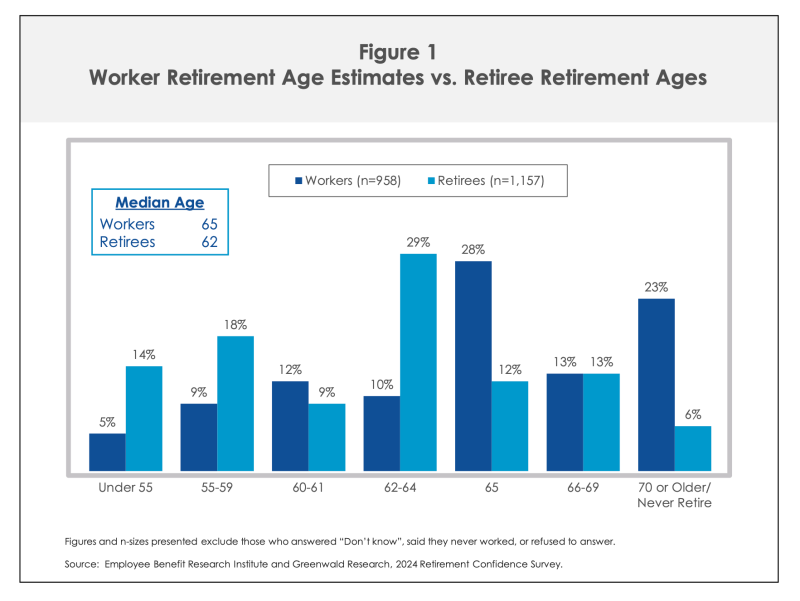- Joined
- Sep 2, 2018
- Messages
- 5,353
- Reaction score
- 1,816
Millions of hardworking Americans dream of one day retiring to an easier life – but at what age?
The latest Retirement Confidence Survey from the nonprofit Employee Benefit Research Institute (EBRI) indicates that there’s a big difference between workers’ expected retirement age and the age at which they actually retire.
The study is based on answers from 2,521 U.S. workers and retirees surveyed online from January 2-31, 2024.

Screenshot via the 2024 Retirement Confidence Survey
As in prior years, there is a big gap between when active workers expect to retire and when retirees say they actually did.
Here are some additional findings from the survey:
Money expert Clark Howard says that, while retiring in your early 60s may seem pretty appealing, there are some financial considerations you need to take into account, especially since we’re living longer than generations before us.
He notes that it’s difficult for many of us to reach the level of financial security required to sustain retirement for what might be 40 years. Clark says this financial freedom applies to maybe 25% of Americans who have access to a pension, own a successful business or are “max savers” in the Financial Independence, Retire Early (FIRE) movement.
“The other 75%, you haven’t been in a position where you’ve been able to save a great deal of money,” he says. “And you don’t have a pension, and you’re not even eligible for Social Security. And how are you going to provide for your health care until Medicare starts at 65?”
“The way it works is you buy one of these policies … usually people buy it in your 60s and it starts paying at age 80 or 85,” Clark says.
The latest Retirement Confidence Survey from the nonprofit Employee Benefit Research Institute (EBRI) indicates that there’s a big difference between workers’ expected retirement age and the age at which they actually retire.
The study is based on answers from 2,521 U.S. workers and retirees surveyed online from January 2-31, 2024.
What Is the Average Retirement Age in America?
According to a fact sheet published with the survey, the median age that U.S. workers retire is 62. Interestingly, the median age that American workers expect to retire is 65.
Screenshot via the 2024 Retirement Confidence Survey
As in prior years, there is a big gap between when active workers expect to retire and when retirees say they actually did.
Here are some additional findings from the survey:
- Just 14% of workers planned to retire before age 60, while 32% did.
- 10% of workers planned to retire between ages 60 and 62, although 29% did.
- 23% of workers expected to retire at age 70 or older or not at all, while only 6% did.
Money expert Clark Howard says that, while retiring in your early 60s may seem pretty appealing, there are some financial considerations you need to take into account, especially since we’re living longer than generations before us.
He notes that it’s difficult for many of us to reach the level of financial security required to sustain retirement for what might be 40 years. Clark says this financial freedom applies to maybe 25% of Americans who have access to a pension, own a successful business or are “max savers” in the Financial Independence, Retire Early (FIRE) movement.
“The other 75%, you haven’t been in a position where you’ve been able to save a great deal of money,” he says. “And you don’t have a pension, and you’re not even eligible for Social Security. And how are you going to provide for your health care until Medicare starts at 65?”
How To Ensure a Comfortable Retirement
Clark says it will benefit your quality of life in retirement if you can continue to work until you reach full retirement age — or even later. Each year you can delay retirement in your 60s will help your wallet tremendously down the road. He says the goal is simple: “Getting some extra years in so you can build up more savings.” from clark.comAnother option you may want to consider is longevity insurance, which pays you every month that you live past a certain age.“You can reach the point where you qualify for Medicare. And if you’re willing to do what I’m about, which is wait until age 70 to take Social Security, it means that if you live till 100, 90 or 85, the Social Security check is going to be so, so, so much larger than it would have been otherwise.”
“The way it works is you buy one of these policies … usually people buy it in your 60s and it starts paying at age 80 or 85,” Clark says.



























































